Revive

+ Exchanging Places – from South Africa to the Caribbean
+ Meet the new Church Engagement Team
+ Cooking with joy at Holy Trinity Brussels


+ Exchanging Places – from South Africa to the Caribbean
+ Meet the new Church Engagement Team
+ Cooking with joy at Holy Trinity Brussels
Spring is here…
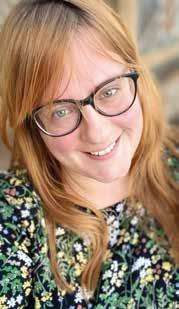
By the time this reaches you, we will have celebrated the most holy season of Easter, and hopefully will be enjoying the joys of spring!
The time of Easter and the beginning of a new season always makes me think of hope – the hope we are given as winter ends and new shoots break through the earth, the hope of warmer days and longer evenings, the hope that we have through Christ our Lord who died on the cross to save us all.
As we observe the world around us we can so often feel somewhat hopeless and see so much despair. It is our aim to try and make sure that this magazine not only informs but that it brings hope to all of our incredible supporters.
In this edition, you will meet our new church engagement team ready to go out across the country building relationships and support from across churches in Britain and Ireland (pages 18-19).
We’re continuing to grow our network of theologians (FeAST) and they had their first conference at the end of last year – you can read all about it on pages 14-15. I also hope you enjoy reading Peniel’s director’s cut as much as I did when compiling this magazine.
Thank you for supporting our work every step of the way – may 2024 be a year in which USPG flourishes and brings much hope around the world.
Welcome to the first 2024 edition of Revive magazine!
In my reflection last year, I wrote about how USPG are having to reckon with our historic links to slavery concerning our stewardship of the Codrington Estate in Barbados. This has been at the forefront during the first few months of 2024 as we embark on the first year of the project. When I recently led a panel at CofE’s General Synod to discuss the response from the Church regarding its historic links to slavery, it was very important to me that we emphasised just how committed we are to the work in deep lament for the wrongs of the past.
Alongside the news reports that the Church Commissioner’s transatlantic slavery investment fund of £100m was simply not sufficient, I am growing increasingly aware of questions being asked by people who believe that because this happened in the past and apologies have been made, we all just need to “move on”. However, USPG believes that this is not an option. As the Rt Rev’d Rose Hudson Wilkin said at our synod event; “the impact of slavery still has a direct impact on black people’s lives today”. This is why we have begun this reparative journey of lament, humility and learning. On pages 16 -17, Jo Sadgrove explores in more depth the impact of the past on the present and I encourage you to give it a read.
The Codrington Reparations Project is just one of the many initiatives and programmes that we continue to support, partner with and launch this year. I hope that by reading about some of our work in the pages of the magazine you will observe how varied and diverse the work we do is and how we are continually seeking to partner with churches across the Anglican Communion in rethinking mission, energising church and championing justice.
Thank you for your continued support.
The Rev’d Dr Duncan Dormor General Secretary and Chief Executive, USPG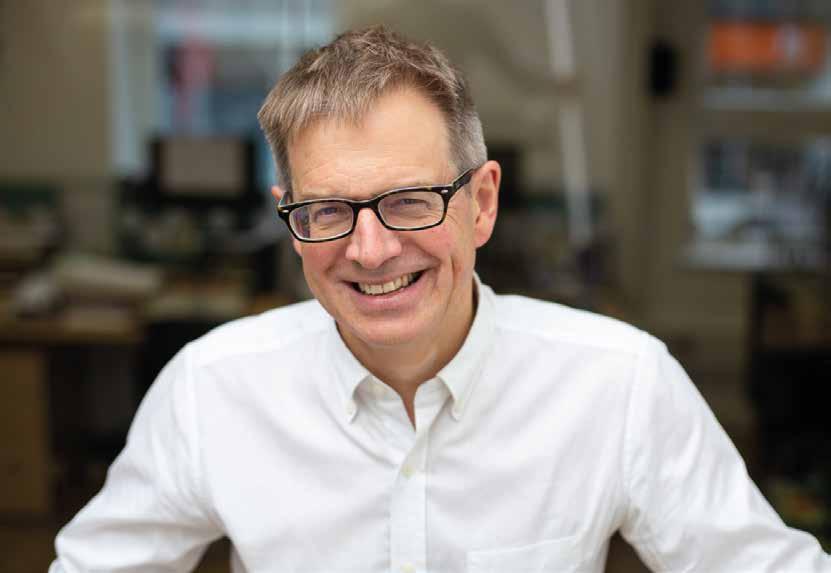
Bishop David announced as Chair of Trustees
USPG are delighted to have appointed the Right Reverend Dr David Walker, Bishop of Manchester as our new Chair of Trustees. The Bishop of Manchester joined our Board of Trustees in December as a trustee and will become chair from July 2024. Bishop Walker will succeed John Neilson, whose six-year term as chair will finish in July, and and we give special thanks to John for his incredible leadership and service as chair over the last six years. We look forward to welcoming the new Chair on board.
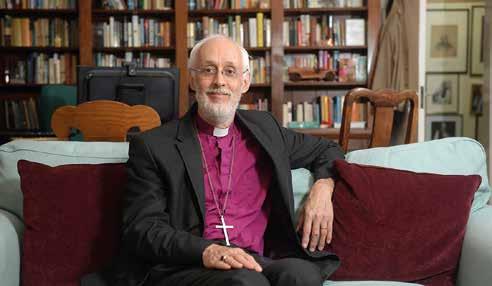
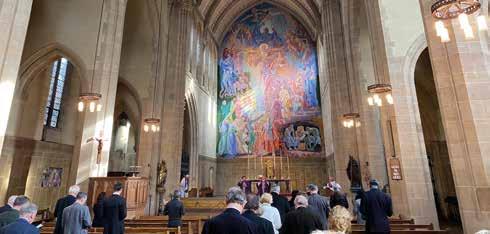
USPG Founders’ Day 2024
‘Being a Christian means being a line in God’s great poem for the world’ – Rt Rev’d Lord Richard Harries, former Bishop of Oxford.
On 15 February, It was great to join SPCK Publishing in the beautiful Saint Alban the Martyr church, Holborn in honour of Thomas Bray, founder of both SPCK and SPG (later USPG).
For news as it happens, don’t forget to follow
@USPGglobal
The USPG office kicked off the year in style with an international food lunch. We enjoyed over 25 dishes celebrating staff member’s diverse cultures and some of the countries we work with. Everything from Sri Lankan-style beef curry, spicy Middle Eastern hummus to Ghanaian spinach curry and so much more…Cheers to the joy of sharing cultures through food.
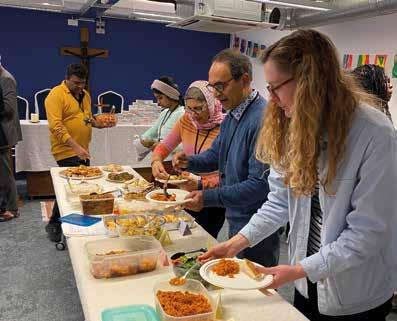
Our Christmas carol service was certainly a big highlight of 2023. St John’s Waterloo church was filled with new and old friends who came together to celebrate the true meaning of Christmas. Bible readings, powerful reflections, and the enchanting voices of The Sixteen choir all made for an extraordinary evening.

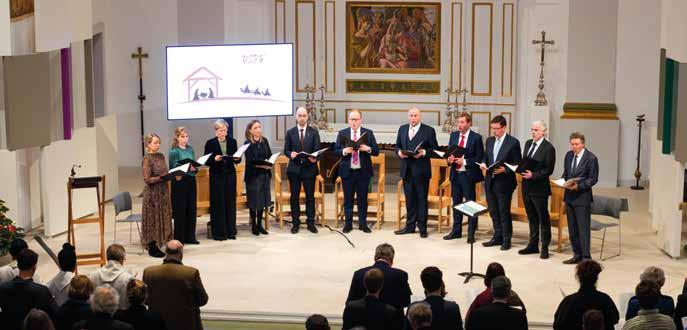

Imran Englefield joined USPG in 2023, with a background as a director of a direct marketing agency for 23 years. His experience in enhancing donor acquisition for many major UK charities through diverse channels has been pivotal in his career. As an Individual Giving Manager at USPG, Imran will apply his marketing knowledge to cultivate and grow relationships with new and existing individual donors, crucial for the organisation’s outreach and impact.
Outside the office, Imran is passionate about health and fitness, serving as a coach for strength-building programs. He is also a sports lover who greatly values spending time with his family, often over coffee and cake.


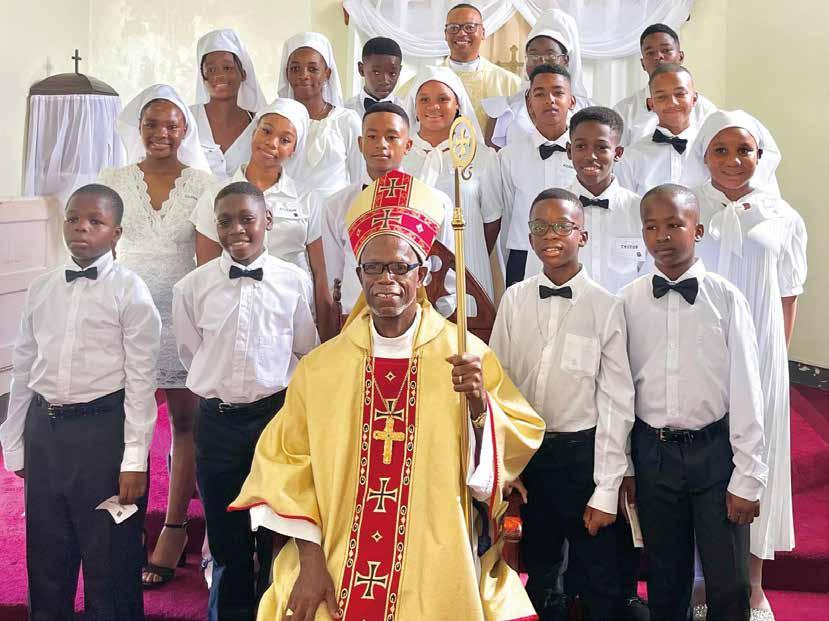
Dr Paulo Ueti, Theological Advisor & Regional Manager: Latin America & the Caribbean
Exchanging is an important part of our life as Christians. We share, support, and learn from each other. The experience of living outside your context and being willing to be curious, be present and reimagine ministry and the holistic mission brings transformation and strengthens faith. USPG has the vision to connect churches and strengthen mission around the world. When two churches find themselves and build friendships and ministry relationships, the kingdom of God is more visible, and it calls all of us to be involved in some way. We encourage our readers to get to know more about this programme and support these relations across the globe so we walk, learn, grow and change the world together towards God´s kingdom and love.
On 4 February 2022, the Noketshe family landed on the Island of Christopher (St. Kitts, Caribbean). The family was welcomed warmly by Dean Cassius and his family. They served at the Pro-Cathedral of St. George for 3 Months, and Rev’d Thandu was then licensed at St. Mary and Christ Church as a Priest in Charge on the 1 May 2022.
The family very much see this ministry as a ministry together. Rev’d Thandu is the priest in charge of two parishes but the presence of the family is pivotal for the success of the mission. He has managed to resume and establish different ministries at St Mary and Christ Church including the children and youth ministry. There is a group of 18 teens who are drummers; there is a youth spiritual dancers group; altar servers and 17 teenagers were confirmed on the 7 January 2024.
The success of the first three years of the programme has meant Rev’d Thandu and his family are now staying for an additional three years as they continue to serve their parishes.
The two countryside parishes and associated churches have quite traditional forms of worship. “We recently purchased sound systems with monitors that contribute positively to our worship”, said Rev’d Thandu.
He continued: “We have chalice bearers, lay readers, and one student doing theological studies online. It is a great joy to both churches that we can spend three more years with them. We were all happy and we made a joyous noise after the notice that my family will have another three years with St Mary and Christ Church. We are honoured to be given an extension to serve in this part of the world.”
The additional three years mean a lot to the family; in the past two years they got to adjust and fit in with the communities and it means the children will get to finish their studies at school. In addition, with the extension granted, it will give them enough time to execute the church’s long-term goals so that the parishes can run smoothly for all ministries, as well as work on a succession plan so all church members are empowered for the future.
Son Olwabo often has to act as the translator for the family as he knows how to speak the local language, he is enjoying Island life and has made many friends from school and church.
He is a long-distance runner at school and part of a football academy. He has also joined a masquerade cultural group and, while at church he is an Altar Server and part of the drumming group.
Daughter Anothando is also involved with both church and social activities, she is part of the college netball team, and she is part of the spiritual dance group.
Bulelwa, Rev’d Thandu’s wife, supports the ministry of young people and is the Sunday school teacher. She always makes sure the church has activities and events for the young ones. She says “Being here has revived my love for the countryside. I was born and bred in a small town called
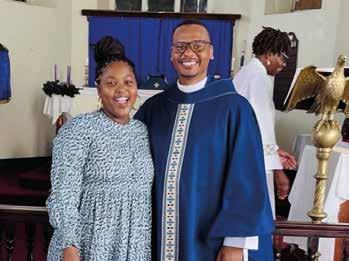
Addo at Hermitage Farm where my grandmother worked as a helper and my mom and uncle as farm workers. I now work on our garden at the rectory and have plans for the church to use the large amount of land we have been blessed with. I enjoy planting fruit trees and vegetables though the monkeys often come and harvest before we do! I now spend my days off in my garden”.
Over the next three years, the focus for Rev’d Thandu and the programme will be on strengthening the relationship between the two churches and the community.
Alongside this, they are tackling a big project this year installing new sanctuary windows in both churches as the current windows have water damage and are incredibly old.
In 2025, they are looking forward to the installation of a new roof for the school hall, which needs replacing due to termite damage. This is vitally important as the state of the current building means they are struggling to host youth activities, sunday school and math classes.
In their third and final year, they will then assess what has been established and start farming their land. The project will involve community members as a great way to mitigate climate change and thus will help the island in its goal to be a sustainable island state.
Pray with us
• For Rev’d Thandu, Bulelwa and their children.
• Pray for the parishes of St Mary and Christ Church, for their leaders and their communities.
• Pray for the island of St Kitts and similar island nations affected by the climate crisis.
Together as family - Rev. Thandu with his wife Bulelwa
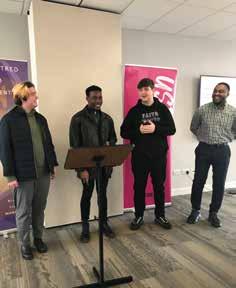
“Mission as solidarity calls us to be discombobulated”
These were the words that were ringing in my ears at the end of the day after being challenged by one of our keynote speakers the Rev’d Philip Peacock as he emphasised how important it is for us to question our privilege and learn from others.
The 2023 annual rethinking mission conference was held in Liverpool in partnership with the Emmanuel Theological College and I was able to attend with a small cohort of staff as we focused on the title theme “Mission as Solidarity”.
Delegates were led in prayers and worship by the Tsedaqah Community at Liverpool Cathedral – our friends at Triangle of Hope.
“What does faithful mission look like in a world that is broken?” Rev’d Dr Kelly Brown Douglas
We then had the privilege of listening to the Rev’d Dr Kelly Brown Douglas, interim president of Episcopal Divinity School and Emmanuel, professor of global theology, and a leader in the field of women’s theology and racial reconciliation. A thoughtful and inspiring speaker, she began by exploring what faithful mission looks like in today’s suffering world. Speaking passionately on the subject, she delved into how it means nothing less than being in solidarity with God. She spoke about how faith is more than “I believe” doctrines and documents, but that, at its heart, faith is about wholeheartedly believing in God’s promise of a more just future for all His children – without any exceptions.
Rev’d Philip PeacockShe explained that getting to this place compels us to undertake a critical examination of moral memory, engage with a moral gaze, form a moral identity, and develop moral proximity and moral participation. It rang true to many of us in the room, that it is only through committing to this hard work that we can ensure we do not miss our calling and move towards a world where we see God’s vision for a just future come to fruition.
After a time of discussion and sharing in fellowship over lunch, the Rev’d Philip Peacock, executive secretary for justice and witness at the World Communion of Reformed Churches took to the stage as the second speaker for the event. And it was more nourishing food for thought as he spoke about how ‘mission as solidarity’ calls us to be discombobulated – a fantastic word that sums up the situation.
Historically, it has been too easy to see “others” as being wrong and “us” as being right. Contrary to this, he emphasised how important it is to learn to question our privilege and learn from others. We must “allow the other to fundamentally change us, twist us out of shape so we are no longer the same”. He ended his speech with the powerful words “what can we learn from those who we set out to save?”
Our time in Liverpool ended with thoughts and reflections in a plenary session. It was an inspiring day listening to some powerful messages of challenge and hope for mission in the future.
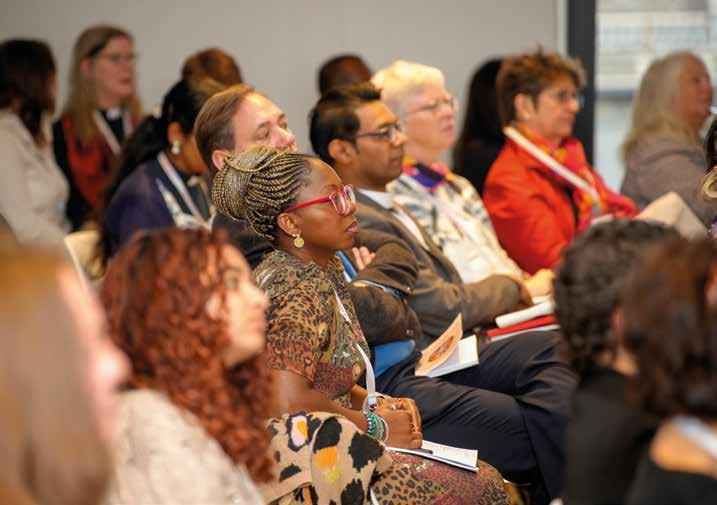
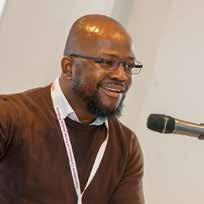 Dr Clementine Nishimwe, Lecturer
Dr Clementine Nishimwe, Lecturer
This new event was a conference to stand as both an affirmation and a call to embrace diversity. The gathering was organised by the Racial Justice Working Group of the Diocese in Europe, in partnership with USPG, alongside others. We came together to engage about something important: racial justice. The conference took place in Freiburg, Germany, from 9-11 November 2023.
What made this conference so unique was that it brought together people from all over the world. We had people of different races, and from different backgrounds. It was like a big, colourful kaleidoscope! That is why the theme of the conference was called “God’s Kaleidoscope: The International and Ecumenical Call to Racial Justice.” We talked in great depth about racial justice and all agreed that it is something deeply connected to our faith. The church has a responsibility to stand up for racial justice for all people, no matter their race or background. One thing that all who attended the conference will always remember is that our diversity is a beautiful reflection of God’s image. Just like a kaleidoscope creates beautiful patterns from different colours and shapes, our diverse community shows the beauty of God’s creation.
These conversations are important for all of us. During the three-day conference, everyone who came had a chance to join in fellowship and learn from each other, making new connections. We did this through different activities like morning worship, evening meditation, Bible study, group discussions and sharing our experiences of racial injustice and healing. We also talked about research on racial justice. For those of us in academia, it was a time to connect our academic work with what is happening in our communities.
We listened to each other and felt God’s presence together, celebrating our differences and what we have in common. For instance, I learned about other communities, like the Sami community in Finland. I learned that some aspects of their beliefs and practices are like those found in some African communities. As we shared stories, ideas, and dreams for a community free of racial injustice, we were reminded that each of us reflects God’s image, no matter our background. As a young academic, the experience provided significant exposure and an invaluable opportunity for professional, personal, and spiritual growth.
USPG and the Church of the Province of Central Africa, the Anglican Church of Tanzania and the Church of the Province of the Indian Ocean are partnering to increase climate knowledge, amplify voices, safeguard the rights of those communities vulnerable to climate change and minimise the impact on humans, animals, and marine life in seven countries through Partners in Gospel Comprehensive Climate Change Knowledge and Climate Justice (PCC).
Linet Musasa, Programme Officer, Anglican Church of Zimbabwe and a member of the PCC Secretariate attended COP 28 alongside Fran Mate, Regional Manager for Africa, USPG.
COP 28 was held in Dubai (UAE) on 3 - 12 December 2023. It saw the convergence of different sectors including the public and private, representatives from civil society, policy makers, faith leaders, youth, indigenous community representatives, scientists, and climate justice advocates came together. Their purpose was to find ways to address the climate crisis and discuss milestones and progress made towards the Paris Agreement goals. Alongside this they discovered ways in which vulnerable communities adapt to the effects of climate change, and the possibility of reducing Green House Gas Emissions by at least 43% by 2030.
COP28 is a key event for the PCC as it presents an opportunity for networking and collaboration with likeminded organisations. The conference was also considered key as a platform for knowledge and information exchange especially for the enhancement of PCC work. The conference also held a wide array of side events, presentations and exhibitions providing information on current research on climate change, policy developments and best practices on climate change and justice. COP28 presented an opportunity for the PCC to strengthen its skills and knowledge through capacity building and training sessions running in the Blue and Green Zones at the event. We attended various events, conversations and meetings within these zones.
Linet, myself and other members of the Anglican Communion also took some time to meet during the busy schedule of
the conference. The team agreed on further engagements and collaboration post-event and to work in collaboration, early on to plan for the next COP and have the PCC actively engaged in Anglican Communion COP events. The discussions paved the way for working in partnership in climate justice work with the PCC and Anglican Communion. It was an exciting time of both fellowship and networking with the Anglican Communion family and ecumenical churches.
At the COP28 Faith Pavilion, faith communities were honoured to have Archbishop Julio Murray, Primate of Iglesia Anglicana de Region Central de America who spoke for ecumenical churches around the world. It was encouraging to see how passionately he spoke about climate justice.
The Archbishop in Jerusalem and Primate of the Episcopal Church in Jerusalem and the Middle East, Dr. Hosam Naoum
speaking at the summit said “I believe that, as much as we have to keep advocating for human rights, we have to keep advocating for the wellbeing of our climate, of our earth, of our environment, because that is home for us”.

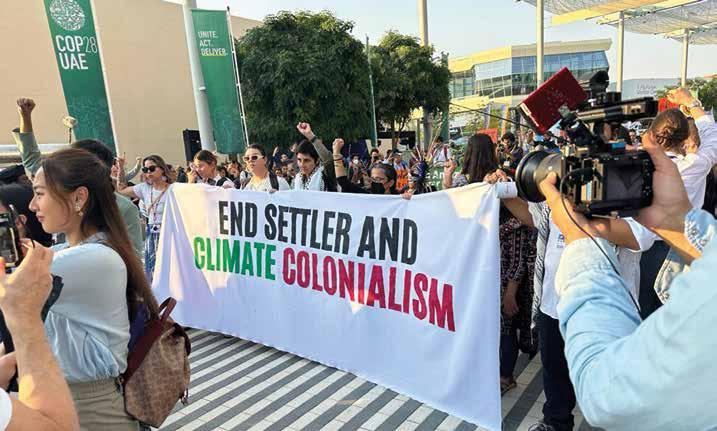
In order to limit global warming to 1.5°C above pre-industrial levels, emissions should already be decreasing and need to be cut by almost half by 2030, just seven years away. We are drastically off track from this target. Rising temperatures are fueling environmental degradation, natural disasters, weather extremes, food and water insecurity, economic disruption, conflict, and terrorism. Sea levels are rising, the Arctic is melting, coral reefs are dying, oceans are acidifying, and forests are burning.
The Internal Displacement Monitoring Centre (IDMC) found that an average of 21.5 million people were forcibly displaced due to sudden weather-related hazards between 2008 and 2015.
“The impacts of climate change on six regions highlight that climate migration hotspots will emerge as soon as 2030 and intensify by 2050, hitting the poorest parts of the world hardest,” states the International Development Research Centre in a statement during COP28. Around 3.3 to 3.6 billion people live in climate hotspots including Sub-Saharan Africa, which accounts for 86 million internal migrants, 19 million more in North Africa, and 40 million migrants expected in South Asia.
Women and children are mostly affected - when women are displaced, they experience a greater risk of genderbased violence, including sexual assault, human trafficking and forced child marriage. “While they sleep, wash, bathe
or dress in emergency shelters, tents or camps, the risk of sexual violence is a tragic reality of their lives as migrants or refugees”. As we reflect on our time at COP28 may we always consider the impact on God’s people as well as His creation. As our time at the summit clarified - now is the time for real action to take place.
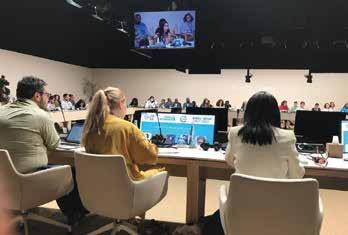
Inspired to take action? Here are some ideas:
• In small groups, learn more with our ‘For Such a Time as This’ study course.
• Organise a litter pick at your church or in your community.
• Make sure you are recycling regularly and in the correct way.
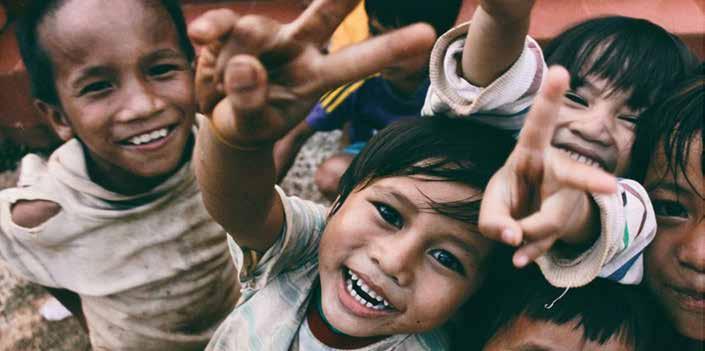
In February, USPG launched its new five-session study course – Freedom in Christ. The word freedom can mean many different things to many people around the world. People can want freedom from conflict, from pain, from their pasts, for their future. Without freedom, we can feel trapped and confined – unable to move forward.
Freedom is a fundamental human desire and so it is no surprise that it is spoken about so often in the Bible. Freedom in the Bible often relates to the spiritual freedom that a person can experience in Christ. We have produced this
course so that this can be explored, within small groups or individually, with prayerful reflection.
The course has been written with our partner churches and organisations around the world and it offers insights and questions as to what true freedom in Christ means in both your life and within the communities you serve.
Here we share an extract from one of the weeks to give you a taster of the course – could this be a resource your small group might like to use over the coming year?
Why is Freedom such an important spiritual theme to reflect, pray and act upon?Reflection
on John 3:36
by Rev’d Bianca Daébs, Igreja Episcopal Anglicana do BrasilThe theme of freedom is present in many biblical texts and especially in some Gospel passages, such as John 3:36, which emphasises the theme of freedom in Christ. The text reads: “So if the Son sets you free, you will be free indeed”.
Two questions arise from this: free from what and free for what? To answer these two questions, it’s necessary to get closer to Jesus and understand the principles that underpinned his life and ministry.
Jesus lived in a time when people were enslaved, women were worth less than men, the sick were beaten down in body and spirit and left to die, the poor were plundered, and power struggles dominated the political agendas of corrupt rulers.
In this context, freeing people from their emotional, physical and social bondages is a daring and revolutionary experience. It means being truly free to love. The freedom to love others as oneself, the exercise of otherness proposed in the Gospels, invites us to act in two ways: the first is to recognise where we are captive, to know exactly what our ‘chains’ are, our difficulties in prioritising what really matters or what transcends our relationships.
It is only after this experience of emptying ourselves of our vanities that we can go beyond ourselves and towards our neighbour.
The freedom proposed by Jesus replaces the centrality of the desire for power with the desire to be. Mercy, grace and forgiveness sustain the exercise of loving our neighbour as ourselves and bring us closer to God’s plan for everyone to have a dignified and just life. Therefore, Jesus frees us to love. And this love becomes a concrete gesture when we realise that the injustices of this world violate God’s purpose for his daughters and sons. In this way, true freedom enables us to practically break down the social prejudices that in many ways destroy people’s lives because of their race, gender, class, disability, etc.
But the freedom that Jesus proclaimed and promoted bothered those who had not experienced it. Hence this ‘love that liberates’ was a source of scandal for a patriarchal, slave-owning, strictly religious and unmerciful society.
In this world that God created, the freedom to love and serve direct human relationships and our relationship with our common home. Anything that violates these relationships takes us away from the dignified and just life that God designed for us.
Today, through his message, Jesus continues to invite us to experience the true freedom that enables us to break out of the bondages that still enslave us, to build a more just and dignified world freely and collectively.
The rest of this reflection and others from Zambia, Britian & Ireland, Korea and Barbados can be found in our Freedom in Christ study guide.
You can order copies to be delivered directly to your door by emailing info@uspg.org.uk or completing the online form via our website www.uspg.org.uk/engage/resources/order-resources
Saving paper? No problem! You can download the resource straight to your device at www.uspg.org.uk/resources/study-courses
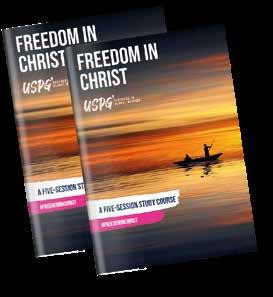
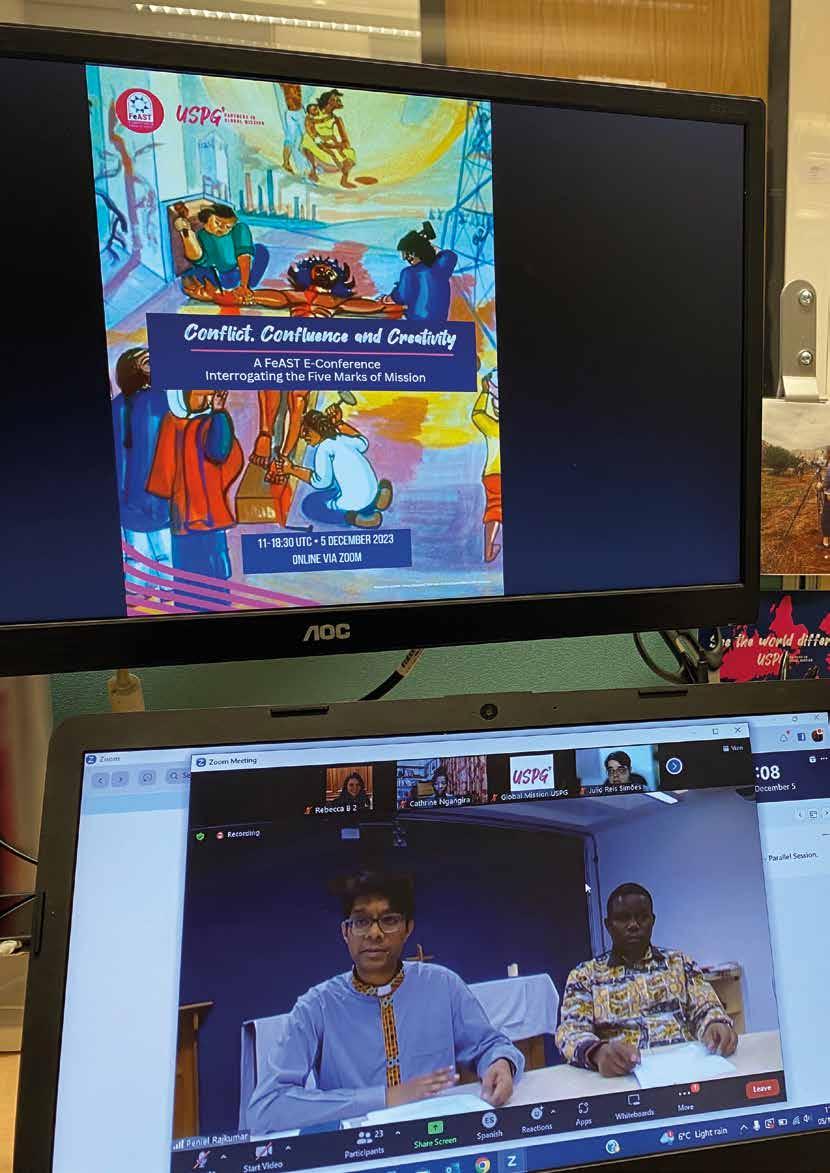
One year ago, USPG launched FeAST, the Fellowship of Anglican Scholars of Theology. The network seeks to build an open table; a space of mutual challenge and sharing through which a new community of Anglican scholars engaged in the academic pursuit of theology can be built. It has been an exciting year for us.
A highlight of the year was the e-conference held on 5th December which drew together over 40 scholars and practitioners from around the Anglican Communion. The day sought to look afresh at the Anglican Communion’s Five Marks of Mission which have been an adopted framework for mission over the past 40 years and, in many ways, have been a marker of contemporary Anglican identity.
As a mission agency that rethinks mission and seeks to be at the cutting edge of missional thinking we welcome the space to revisit the rationale, role and relevance of these marks in the re-imagination of mission.
The conference opened with a thought-provoking address from Dr. Masiiwa Ragies Gunda from the World Council of Churches who provided a decolonial critique of the Five Marks of Mission. He spoke about how the goodness of creation became disrupted with humanity taking centre stage. Highlighting the impact of imperial projects that hid erasure, colonisation and destruction behind the missional imperatives of teaching and proclaiming, he left us with the questions of how we can re-member, re-claim and re-imagine the mission of God in a way that will decolonise the role of the church in that mission?
The FeAST network seeks to provide a platform for emerging scholars and to break down the ‘opportunities divide’ that limits the participation of global majority heritage theologians in global conversations. For the second session of the conference, we split into parallel paper sessions. This offered eight schools the opportunity to present short papers. Themes of these papers included an examination of ‘Mission and Anglican Theological Education in the current Brazilian scenario’, ‘Integrity of creation: An Old Testament response for mission of the church towards ecology’ and ‘Critiquing the Marks of Mission in light of contemporary British Chaplaincy Studies’. Participants were able to discuss and interrogate what they heard.
Two of these theologians were Fr Victor Hugo and Dr Rodrigo Espiúca, both from IEAB. Sharing their perspectives on joining the conference: Fr Victor shared “the experience at the FeAST 2023 e-conference was very positive.… I was pleased to be able to participate in the speeches by my Brazilian colleagues. I believe that this type of event is very important for meeting people, learning about the diversity of the Church and making our contribution to it.” Dr Rodrigo shared, “my participation in the conference was very rich in terms of learning about new theological perspectives of the Anglican Communion. The panelists’ presentations highlighted in-depth reflections on contemporary Anglican
theology, allowing us to think about its application in everyday pastoral work. I hope other similar conferences occur more frequently.”
The conference ended with an inspiring keynote by Dr Kwok Pui-lan. She emphasised the need to move beyond British colonial hegemony to be a polycentric Communion that serves God’s mission and responds to the needs of the marginalised and vulnerable people. In doing so we are challenged to learn to live in the uneasiness and messiness of conflictual options and diverse theologies. She concluded by stating that “many Anglicans would like to see the birth of a new church: a church that is not afraid of cultural differences but welcomes the diversity of the Body of Christ as its strength.”
Through the ongoing events and publications of the USPG FeAST network, we seek to celebrate this diversity and the creativity, critical edge and courage that emerges when we extend the table and build a wider community of scholars.
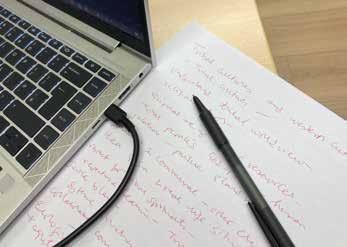
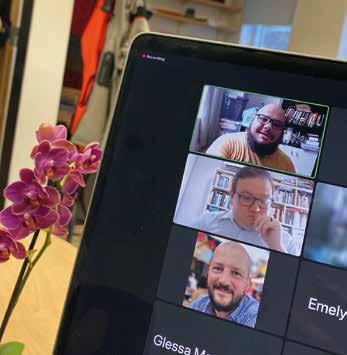
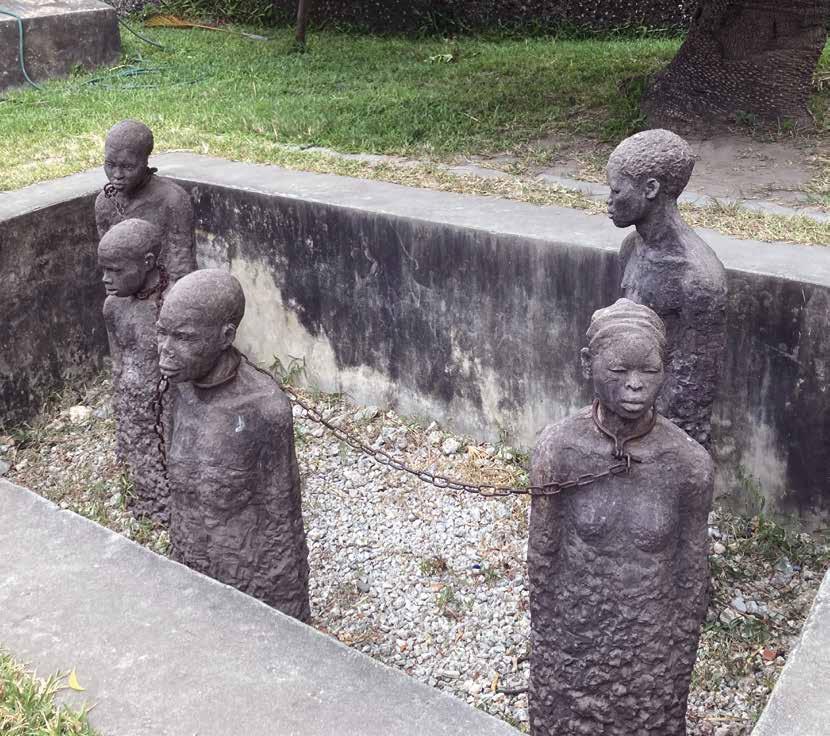
In February 2023, USPG held its triennial international consultation in Dar es Salaam, Tanzania entitled Set My People Free: The Call of the Church Against Human Trafficking. The gathering drew Anglican leaders and practitioners from 29 Anglican provinces to share how the Church in each context was working to mitigate the dehumanising effects of human trafficking.
It was no accident that we were meeting in Tanzania to talk about the forced movement of people for profit. The history of trading in African bodies across the Indian Ocean dates back over 1000 years. Tanzania, and particularly the island of Zanzibar, which became East Africa’s largest slave market, have played central roles in the transportation and enslavement of people.
Archbishop of Tanzania The Rt Rev’d Maimbo Mndolwa, himself a historian, was keen to ensure that the history of the East African or Indian Ocean slave trade was recognised within wider conversations and work being undertaken in USPG about archives, enslavement and Christian mission. The history of the East African slave trade is, of course, critical to the historical mission of USPG. One of its predecessor organisations, The Universities Mission to Central Africa (UMCA), was established, in part, actively to oppose the trade in enslaved people that persisted into the late 19th century in East Africa.
As USPG has been engaging with its archives and the implications of its often-troubling history, not least SPG’s history as a former slave-owning organisation, surprising questions coming from some have concerned why we should care about our history? Specifically, why worry about the actions of our predecessors, over which we have no control? These are not easy questions, even for Christian organisations, whose orientation to the present sits firmly embedded within the Biblical communities of the past and the hope for the coming of God’s Kingdom in the future. Christians, for whom the past, and the people of the past, are wrapped into those in the present and the future, as a global community of ancestors and descendants, scattered across space and time.
During the 2023 consultation, we visited Christ Church Cathedral in Zanzibar, built by Universities Mission to Central Africa missionaries on the site of the former slave market in 1879. We also visited the adjacent East Africa Slave Trade Exhibit, housed in the UMCA former mission hospital, which itself sits directly over the holding cells for enslaved Africans. Visiting these dungeons was, for all, an extremely difficult experience.
We convened in a nearby chapel to reflect on what we had experienced and how we were feeling. As the conversation unfolded amongst this diverse group, a fascinating and moving conversation emerged. The lasting impacts of histories of colonisation, Christianity and violence, evoked by the visit, were shared by
representatives from Africa, the Caribbean, South America, Asia and Oceania.
We heard of the pain of local people in Zanzibar, unable to put together a proper family tree, their identities and stories compromised by the all too recent enslavement of their ancestors. We heard anger directed at the countries in the west and east, whose economies ‘based on crime’ and built through colonial plunder, continue to keep some countries rich and others reliant on aid for ‘development’, itself nothing more than palliative care. The ongoing abuse, violence and marginalisation facing women and girls were named as another inheritance of a colonised past. We were taken back to Cape Coast Castle in Ghana, where the SPG chapel sits directly over the slave dungeons, meaning that any priest celebrating the Eucharist at the altar would have heard the groaning and wailing below. And we reflected on the heartbreak that comes not from what is seen in sites like the Zanzibari slave dungeons, but what is felt spiritually; we were reminded that the memories of slavery are held in the body as trauma and spiritual bondage, and remain there for generations.
As a Communion forged through colonisation, our global relationships are riven with the fissures of our shared colonial history. We see this perhaps most powerfully in the debates about homosexuality. These Communion-wide tensions emerging in significant part out of the historical crucible of state colonisation and missionary endeavour, have torn provinces away from each other. We see it in the persistent racism, classism and sexism that differently plagues churches and communities around the world.
How do we corporately own the pain and violence that our forebears have inflicted on each other to produce such degrading systems? How might encountering the past help us all move into a deeper knowledge and relationship with others who share wildly different experiences of that past? What might we all gain from knowing what has survived and the strategies that have enabled that survival? What might we learn about humanity, about hope, and the power of relationship and forgiveness to heal us all?
As Christians, our praxis is engaging the past in the present, and seeking hope for a repaired future. We do this daily as we join with our ancestors through the scriptures. This is our tradition. And we must be bolder and more confident in sitting in this place of discomfort –between past, present and future – because doing so not only enriches us by deepening our understanding of ourselves but extends solidarity to those for whom the impact of our actions in the past daily perpetuates pain in the present. Engaging honestly with our history readies the ground on which we can approach the work of repair, repentance and reconciling – of ourselves to each other and of us all to God’s mission.
We are very happy to introduce ourselves as the newly formed Church Engagement Team. It’s our privilege to build and maintain relationships with you through gatherings and outreach events, as well as individual meet-ups. Here’s a bit about ourselves:
Fiona joined USPG as the Engagement and Fundraising Officer in November 2023, having previously worked at the Institution of Civil Engineers as an Events Officer. Alongside Carol, she is responsible for church engagement and the volunteer supporter journey. She also organises USPGs presence at Christian festivals and challenge runs.
Fiona has a MSc in Children’s Youth and International Development, volunteered as a UNICEF Children’s Champion and spent time in the South of Brazil researching and training on the situations of street-connected teenagers, to promote quality of life.
She loves to travel and while a piece of her heart stays in Brazil, she is currently developing a love of the Turkish language.


Carol joined USPG in January 2024 as Church Engagement Manager. She brings a chequered professional history, including Kitchen Planner at Ikea, Missions Coordinator to Ukraine, and most recently, New Wine Leadership Network Relationship Manager.
Carol describes her strategy for building relationships as finding new best friends and getting them excited about USPG. She is passionate about resourcing churches and church leaders.
Carol is married to H and together they have four adult children and two grandsons. In her spare time, she enjoys running, cycling, going for long walks, travelling and cooking (her ‘happy place’).
Across the year, we’ve planned many ways to share the important work of USPG and the amazing resources we create for churches and church leaders to grow in their understanding of mission. And we are stepping – or rather running – out in pink by sponsoring three half marathons across the year. Look for us at Truro Diocese’s Big International Fair, Big Church Festival and Greenbelt too.
As Carol puts it: ‘USPG has so much to offer churches and dioceses. We want to exemplify relational generosity, giving from the vast sum of knowledge and human resource that we have through our connections across the Anglican Communion. We want to be a gift to you and your churches – the gift of a new perspective on contextual mission, of tangible resources to grow your church communities, and the value of working toward our common purpose: God’s Kingdom Come.’
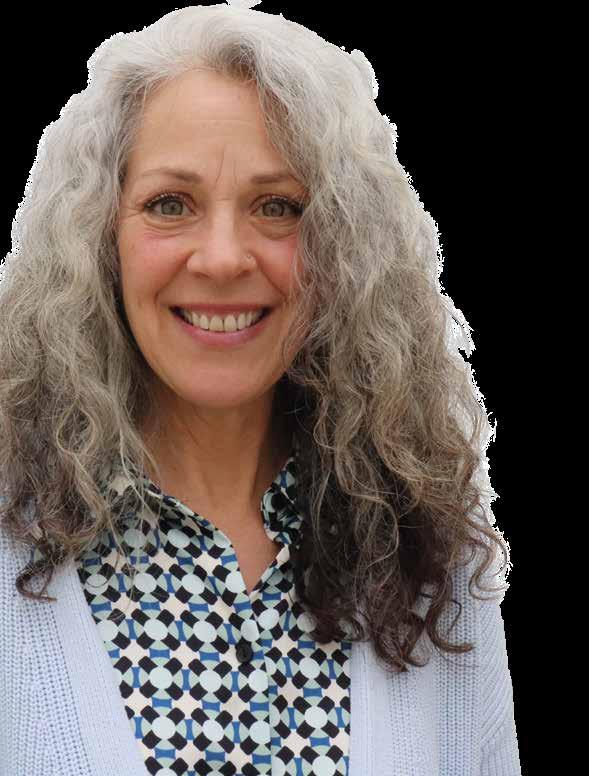

A big part of our plan is to reconnect with our wonderful volunteers: event help, bishops’ nominees, speakers, diocesan reps, parish reps, etc. Many of you were introduced to USPG at some point along your faith journey. You are valued ambassadors for USPG, please tell your story when you have the opportunity.
Let us hear from you! Call or message Carol or Fiona at volunteer@uspg.org.uk and tell us of the ways you have been impacted by the work of USPG. It would be a great way to get to know you better. We truly believe that together we can inspire others to find themselves in God’s great mission to reconcile all that is broken to His goodness and mercy.
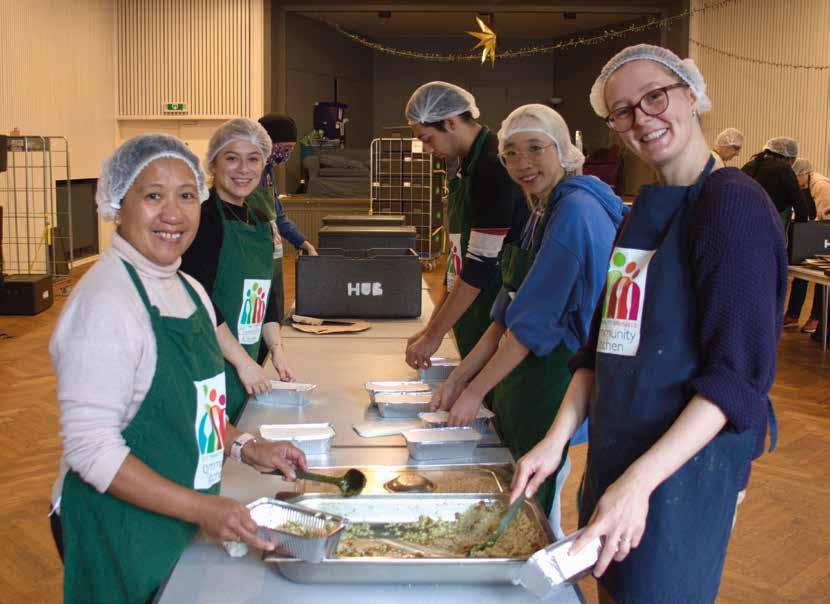

Set up by Holy Trinity Brussels, Community Kitchen is a food project for the hungry, homeless, or vulnerable in the city – many of whom are refugees and asylum seekers. On a recent visit we learnt how your giving, distributed by the Diocese in Europe, impacts both beneficiaries and volunteers.
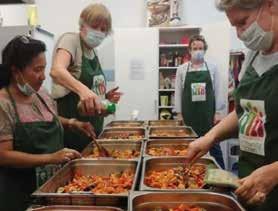
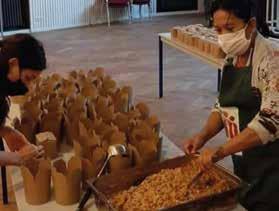
On most days of the week, the church hall at Holy Trinity Brussels is open and ready for business. The newly appointed operations manager distributes aprons to a wide range of volunteers, and the work begins. Vegetables are chopped and the pans stirred. All the while volunteers chatter and portion the nutritious meals into takeaway boxes ready for delivery. From its conception in 2019 the goal of Community Kitchen has been simple: feed those in need.
“We want those we serve to receive the food joyfully” shares Lyn, a long-term committed volunteer, “so we have always cooked with love and joy”. By being open to how God might use the church’s facilities for good, a team at Holy Trinity Brussels opened Community Kitchen in 2019. They began to produce around 200 meals a week. Over the Covid 19 pandemic volunteers carried on, adapting to restrictions that brought to light many of the struggles affecting their community including homelessness, social isolation and hunger. Thanks to USPG funding as part of our ongoing engagement with refugee response ministries in the Diocese in Europe, the project has significantly grown. Now, an eyewatering 5000 meals come out of the church gates every week. This accounts for almost all of the hot food distributed at a Red Cross Humanitarian Hub in downtown Brussels.
For Lyn, serving at Community Kitchen is a way of reflecting God’s character. Despite the scale of the operation the mission remains “to go where the need is”. Holy Trinity Brussels, like any church looking to support its local community, is very aware of its surroundings. For example, much of the existing infrastructure for asylum seekers in Brussels is inadequate and forces many into precarious situations, which means that many rely on hubs for food and other services. However, the Community Kitchen offers more than just food. In recent months the project has been able to offer volunteering contracts to refugees to volunteer in the kitchen, under which it is possible to pay a modest volunteering allowance.
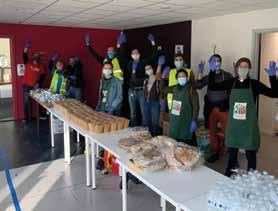
Joe*, a refugee from Cameroon, found it difficult to settle in Brussels as there was barely any work available for him. He now volunteers in the kitchen at almost every session. He also has access to the meals and donated food. Joe tells us that volunteering with the kitchen has transformed his life. He regards the kitchen as his workplace and feels that he is doing something worthwhile.
Farah* is a refugee from Iran. With no access to secure housing and work, her mental health had deteriorated. She suffers from anxiety and other health issues as a result of her past. She reports that it is only when she is working in the kitchen that she feels relaxed and content. Through contacts made at the kitchen she has also now found a secure place to live.
Community Kitchen is therefore a safe and welcoming space for volunteers from all walks of life. Thanks to the volunteering app, ServeNow, anyone wanting to volunteer in Brussels can find out about the project. As a result, the team of volunteers has ballooned to 100+ and includes many who come looking to serve and to make new friends. For it is a beautiful thing that a first-year international student or an Iranian in pursuit of safety, both otherwise lonely and lost in a new city, can find community here. Lyn even joked that two volunteers have started dating!
As the stained-glass window at the rear of the church building reads, many at Holy Trinity seek to live out the motto “Brussels for Christ”. For Lyn, this often starts with a simple “come and see” – as she invites volunteers who are interested to meet the source of her joy. After all, “at church we hear the Gospel. At the Community Kitchen we act.” she finished with a smile.
Let us pray
• We pray for wisdom for the Holy Trinity Brussels Community Kitchen as they continue to serve vulnerable people with complex needs. May they be guided by God in all they do.
• We pray that the lives of beneficiaries like Joe and Farah may be transformed so that they too may become instruments of God’s love.
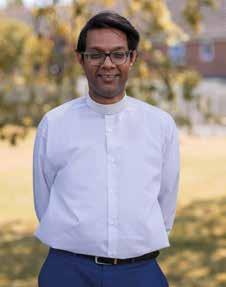
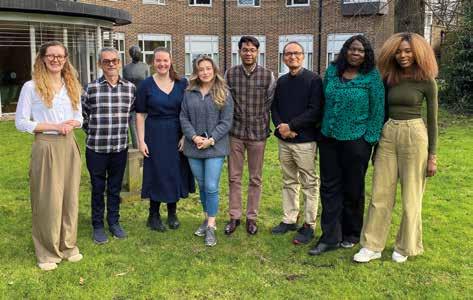
I started working for USPG in July 2021, initially in a unique role as Global Theologian and took up additional responsibility as Director of Global Mission in February 2023. The best thing about my role in USPG is that it helps me to interweave the engagement of the head (intellectual work), with the engagement of the heart (building relationships) and engagement of the hands (working in solidarity with global partners) as we seek to fulfil USPG’s three strategic objectives – rethinking mission, energising church and championing justice.
Of course, one of the questions people usually ask me is how I manage the two roles. I often tell them that managing more than one role has been the story of my professional life – in my previous role with the World Council of Churches (WCC) I was Programme Executive for Interreligious Dialogue, but also a faculty member of the Ecumenical Institute in Bossey. Similarly, when I was at the United Theological College, Bangalore, India I was an Associate Professor for Christian Social Ethics as well as Director of Field Education, as well as being an Associate Presbyter in the Church of South India. There you go – you get a glimpse of my journey to USPG through India and Switzerland.
Cultivating agility in my role has been an important learning aspect of my work over the last year and I am blessed to have an excellent team of eight colleagues who are constantly working in ways that are both proactive and responsive in discerning where God is leading us in mission.
I think the work of the global mission team is the heartbeat of USPG’s work of partnering with churches worldwide in God’s mission. Our engagement is varied, but it is always aligned with
the priorities of churches – theological education, health care, gender justice, ecological and economic justice, and capacity building of youth and women, to name a few. We work ‘with’ our partners and not ‘for’.
In the coming years, our aim as a team is to build our cross-provincial work, leveraging USPG’s convening capacity. We are launching an ‘Emerging Leaders Academy’ this year which is a global discipleship programme for young people, we also will be initiating a ‘Bonds of Affection’ process which will bring together networks of people involved in different aspects of mission for mutual learning. Last year we launched FeAST (Fellowship of Anglican Scholars of Theology) a platform for theological encounters and exchange for theologians. All this is exciting stuff!
On the personal side, I love travelling with my wife and two sons and reading a detective novel. I am a keen cricketer – the highlight of my cricketing career was representing the Diocese of London in the Church Times trophy as a spin bowler. I think the most creative things in life come with a good spin – turning things around where you least expect it – like God in Christ did for us, bringing new life through death on the cross.
YOUR DONATION LIGHTS UP LIVES WITH THE PROMISE OF A BETTER TOMORROW

Support the Anglican Episcopal Church of Brazil in their crucial role at Casa A+ to provide not just medical treatment to those in despair, but also to raise awareness of potentially life-threatening conditions like HIV & AIDS. Give today. Scan the QR code or visit lent.uspg.org.uk

dates for diary
Across the year, we’ve planned many ways to share the important work of USPG and the amazing resources we create for churches and church leaders to grow in their understanding of mission. Here are a few dates to note:
25 – 26 May, West Sussex
If you’re planning on attending, please join us on the stand and sport a bright pink t-shirt!
3 – 9 June
Celebrating you and sharing your stories. Look out for some exciting online events.
9 – 11 July, High Leigh Conference Centre
Book your tickets to our 2024 conference - United Beyond Borders now. All are welcome to join us for the three-day residential conference which involves keynote speakers (including the Very Rev’d Professor Kelly Brown Douglas and Bradon Muilenburg), workshops and several times of fellowship and worship. This year, we’re delighted to be back at the beautiful High Leigh Conference Centre.
To find out more information and to book go to www.uspg.org.uk/get-involved/events/ uspgconference/conference-2024/
22 – 25 August, Boughton House, near Kettering Message fionao@uspg.org.uk if you’d like to join on the stand.
8 September, Newcastle
Looking for a challenge? Let us know if you – or someone you know – would like to be one of the five runners raising money for the global church.
16 December, St John’s Waterloo in London
A great opportunity to spend a day – or the weekend – in London and finish it off with a Carol Service, mince pies and mulled wine.
USPG – 5 Trinity Street, London SE1 1DB 0207 921 2200 www.uspg.org.uk
Follow us on @USPGglobal
Editor: Rachael Anderson Sub-Editor: Rachel Weller communications@uspg.org.uk
Charity number 234518